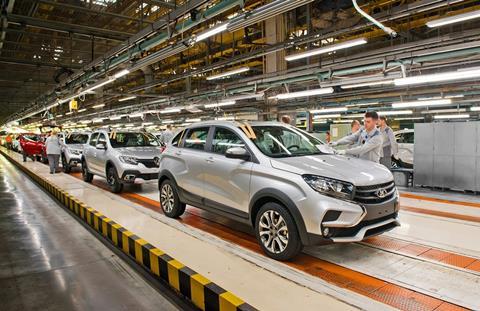Until recently, Chinese automotive exports to Russia continued to grow. During the first half of 2024, light passenger vehicle exports from China jumped by 35.4% and were valued at $6.2 billion, according to China’s General Administration of Customs. Imports of trucks dropped by 24% to $1.3 billion, though this was not enough to undermine the overall positive trend in vehicle trade.

Momentum built over the first half of the year. In the second quarter of 2024, exports amounted to $3.9 billion, against only $2.3 billion in the first quarter.
However, there are now signs that Chinese automotive parts exports to Russia might have hit a roadblock and finished vehicle exports could be in danger of doing the same.
Sergey Gromak, vice-president of Avtovaz said Chinese component suppliers may curtail exports to Russia to avoid the risk of secondary sanctions from the US.
Speaking during a press conference in July, Gromak revealed that recently, Chinese companies have started pulling out from contracts with the leading Russian automaker, referring to threats from the US.
Russian automotive importers have complained about difficulties in making payments to Chinese suppliers since early 2024. The issue reportedly significantly worsened after the US broadened the criteria for imposing sanctions in June.
In the past two years, China has increased its dominance along the Russian automotive industry’s supply chain. Considering this, Gromak warned that the Russian automotive industry may soon have to rely entirely on its local component base.
Gromak revealed that despite some progress in the import-replacement campaign, Avtovaz’s flagship Lada model still uses around 1,500 imported parts that are not manufactured in Russia. The high dependence on Chinese parts makes the future of the Russian supply chain highly uncertain.
“We don’t know to what extent the sanctions pressure will further tighten,” said Gromak. “We see that a number of Chinese component manufacturers are seriously concerned about secondary sanctions. We see problems with payments for components. Therefore, we need to work with Russian manufacturers since we have nobody else to work with.”
Market collapse
Avtovaz’s problems are only the tip of the iceberg. The situation has escalated to the point where market players are sounding the alarm about the potential halt of Chinese finished vehicle exports to Russia, a development that could have severe repercussions for the Russian market.
“The Russian market may lose its last major foreign supplier of finished vehicles [and] there is a risk of stopping imports of finished vehicles and components from China to the Russian Federation,” said Alexey Podshchekoldin, president of the Russian Automobile Dealers Association, unveiled during a separate press conference in early July.
As China accounts for 92% of Russian finished vehicle imports and over 60% of finished vehicle sales in the country, the market is braced for a tough blow.
Citing several sources in the market, Russian newspaper Noviye Izvestia warned that the Russian market may be heading into a collapse, as no new finished vehicles from China or Avtovaz will leave the market almost completely empty.
“In my opinion, our ‘friends’ from the US managed to get China to suspend payments,” Podshchekoldin said, adding that “problems are growing like a snowball”, and the impact is seen across the board. “Everyone is experiencing problems.”
Delayed impact
As an example of what those importing vehicles deal with, Podshchekoldin revealed that because of sanctions from the West, even if money from Russia reaches China, its further movement is restricted now, and Russian firms have to spend months trying to get their money back and try alternative payment methods.
Today, some Chinese OEMs are continuing to ship goods on credit because payment problems have not been resolved, noted Ekaterina Kizevich, CEO of Atvira, a local firm facilitating trade with China.
The Russian market is yet to feel the impact of the recently increased US sanctions since their effect is usually delayed.
“The effect of this situation, which is now becoming widespread, will be visible in two or three months,” said Ararat Mardoyan, owner of Autodegustator, a Russian import company.
Mardoyan explained that Russian dealers still have their warehouses full, plus some deliveries were paid before the new problems emerged. However, he added, prices may jump this autumn and vehicle range may narrow.
“There may also be a reduction in supply in the mass segment, since such models simply will not be imported,” he warned.

























![Global[1]](https://d3n5uof8vony13.cloudfront.net/Pictures/web/a/d/s/global1_726550.svgz)













No comments yet